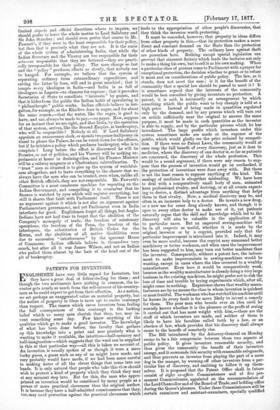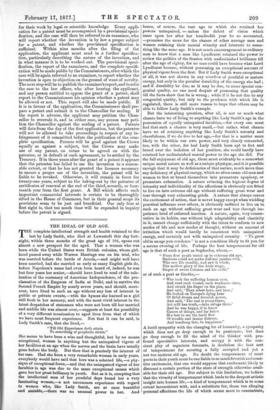PATENTS FOR INVENTIONS.
ENGLISHMEN have very little regard for Inventors, but they have a great deal of fellow-feeling for them ; and though the two sentiments have nothing in common, the in- ventor gets nearly as much from the self-interest of his country- men as he could expect to get from their affection. As a nation, we set perhaps an exaggerated value on material property, but the notion of property in ideas is more apt to excite contempt than respect. The reason which saves inventors from feeling the full consequences of this contempt is the lurking belief which so many men cherish that they, too, may in- vent something some day. Few know anything of the qualities which go to make a good inventor. The knowledge of what has been done before, the faculty that gathers up this knowledge into a point and sees precisely what is wanting to make it available, the intuition—half-memory and half-imagination—which suggests that the want can be supplied in this or that particular way—all this is taken no account of. An invention is usually spoken of as though it were a mere lucky guess, a guess such as any of us might have made, and very probably would have made, if we had been more careful in making notes of all the clever things that come into our heads. It is only natural that people who take this view should wish to protect a kind of property which they think they may at any moment step into. But for this, the man who appro- priated an invention would be considered by many people as a person of more practical cleverness than the original author. It is because they have a half-admitted consciousness that they, too, may need protection against the practical cleverness which leads to the appropriation of other people's discoveries, that they think the inventor worth protecting. It must be conceded, however, that property in ideas differs from other property in this,—that its protection makes a more direct and constant demand on the State than the protection of other kinds of property. The ordinary laws against theft are powerless here. Nothing except special legislation can prevent that sincerest flattery which leads the imitator not only to make a thing his own, but to sell it as his own making. When a particular class of persons come to Parliament with a prayer for exceptional protection, the decision whether to grant or to refuse it must rest on considerations of public policy. The law, as it stands, does not meet the case; • is it for the benefit of the community that a special law should be passed to meet it ? It is sometimes argued that the interests of the community would be best consulted by giving inventors no protection. A patent, it is said, is necessarily an arrangement by which something which the public want to buy cheaply is sold at a high price. Instead of being made in quantities regulated only by the demand, and by any process which will turn out an article sufficiently near the original to answer the same purpose, it must be made in such quantities as the inventor is able to supply, and by the particular process which he has introduced. The large profits which inventors under this system sometimes make are made at the expense of the public, which would gladly see the price reduced by competi- tion. If there were no Patent Laws, the community would at once reap the full benefit of every discovery, just as it does in medicine, where the discovery of one doctor is, so far as patients are concerned, the discovery of the whole profession. This would be a sound argument, if there were any reason to sup- pose that the process of invention would go on unchecked, if the protection of inventions were done away with. But there is not the least reason to suppose anything of the kind. The analogy of medicine is altogether misleading. We have here to deal with a comparatively small body of men, animated keen professional rivalry, and deriving, or at all events expect- ing to derive, a distinct advantage from anything that helps them in that rivalry. Now, a medical discovery may be, and often is, an immense help to a doctor. He invents a new drug, or a new use for some drug already known, and though it is open to every other doctor to make use of it, yet patients naturally argue that the skill and knowledge which led to the discovery will also be valuable in the application of it to particular cases. But an improved sewing-machine will be in all respects as useful, whether it is made by the original inventor or by a copyist, provided only that the particular improvement is introduced into it. Indeed, it may even be more useful, because the copyist may command better machinery or better workmen, and when once the improvement has been suggested to him, may turn out better machines than the inventor. Consequently, without a patent law, the induce- ment to make improvements in sewing-machines would be wanting, except in cases where the idea occurred to a wealthy manufacturer. Even here it would be comparatively weak, because as the wealthy manufacturer is already doing a very large business in the existing machines, he might prefer not to risk the loss of time and trouble by trying experiments which, after all, might come to nothing. Experience shows that wealthy manu- facturers are by no means the class in whom invention is quickest or most fruitful. The workman who has watched his machine nntil he knows its every fault is far more likely to invent a remedy for them. The poor man who broods over an idea until he scarcely knows whether it is the pleasure or the profit of seeing it carried out that has most weight with him,—these are the stuff of which inventors are made, and neither of them is likely to have his faculties called forth by a law, or an absence of law, which provides that his discovery shad always enure to the benefit of somebody else.
The Bill introduced by the Attorney-General on Monday seems to be a fair compromise between these two aspects of public policy. It gives inventors reasonable security, and thus gives the community the benefit of their inventive energy, and it surrounds this security with reasonable safeguards, and thus prevents an inventor from playing the part of a mere dog in the manger, by warning off other inventors from a par- ticular line of discovery, and omitting to follow it up them- selves. It is proposed that the Patent Office shall in future consist of eight ex-officio Commissioners and of five per- manent Commissioners, appointed on the recommendation of the Lord Chancellor and of the Board of Trade, and holding office during the Queen's pleasure. Under these Commissioners will be certain examiners and assistant-examiners, specially qualified for their work by legal or scientific knowledge. Every appli- cation for a patent must be accompanied by a provisional speci- fication, and the case will then be referred to an examiner, who will report whether the invention is by law a proper subject for a patent, and whether the provisional specification is sufficient. Within nine months after the filing of the application the applicant must send in a further specifica- tion particularly describing the nature of the invention, and in What manner it is to be worked out. The provisional speci- fication, the report of the examiners, and the complete specifi- cation will be made public by the Commissioners, after which the case will be again referred to an examiner, to report whether the invention is open to objection on the ground of want of novelty. The next step will be to publish the examiner's report, and to refer the case to the law officer, who after hearing the applicant, and any person entitled to oppose the grant of a patent, shall report to the Commissioners his opinion whether a patent may be allowed or not. This report will also be made public. If it is in favour of the application, the Commissioners shall pre- pare a patent and submit it to tie Chancellor for sealing. If the report is adverse, the applicant may petition the Chan- cellor to overrule it, and in either case, any person may peti- tion the Chancellor against the sealing of a patent. Patents will date from the day of the first application, but the patentee will not be allowed to take proceedings in respect of any in- fringement of it committed before the publication of the com- plete specification. Patents will be good against the Crown equally as against a subject, but the Crown may make use of any patent, on terms to be agreed on with the patentee, or in default of such agreement, to be settled by the Treasury. If in three years after the grant of a patent it appears that the patentee has failed to use the invention to a reason- able extent, or that he has not granted the licences necessary to ensure a proper use of the invention, the patent will be liable to be revoked. Otherwise, it will remain in force for twenty-one years, subject to the taking-out by the patentee of certificates of renewal at the end of the third, seventh, or four- teenth year from the first grant. A Bill which affects such important commercial interests is certain to be thoroughly sifted in the House of Commons, but in their general scope its provisions seem to be just and beneficial. Our only fear at first sight is, that too much time will be expended in inquiry before the patent is signed.



































 Previous page
Previous page